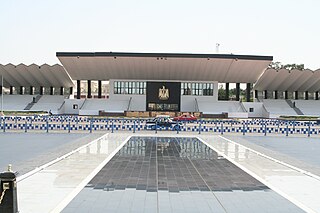Note: This compilation includes only those attacks that resulted in casualties. Attacks which did not kill or wound are not included.

Terrorism in India, according to the Home Ministry, poses a significant threat to the people of India. Compared to other countries, India faces a wide range of terror groups. Terrorism found in India includes Islamist terrorism, ultranationalist terrorism, and left-wing terrorism. India is one of the countries most impacted by terrorism.
In June 2000, the North Caucasian Chechen separatist-led Chechen insurgents added suicide bombing to their tactics in their struggle against Russia. Since then, there have been dozens of suicide attacks within and outside the republic of Chechnya, resulting in thousands of casualties among Russian security personnel and civilians. The profiles of the suicide bombers have varied, as have the circumstances surrounding the bombings.

Terrorism in Egypt in the 20th and 21st centuries has targeted the Egyptian government officials, Egyptian police and Egyptian army members, tourists, Sufi Mosques and the Christian minority. Many attacks have been linked to Islamic extremism, and terrorism increased in the 1990s when the Islamist movement al-Gama'a al-Islamiyya targeted high-level political leaders and killed hundreds – including civilians – in its pursuit of implementing traditional Sharia law in Egypt.
11 July 2006 Srinagar bombings consisted of five grenade attacks by militants, killing 8 people and injuring 43 in Srinagar, Jammu and Kashmir.

Jundallah was a militant group associated with Tehrik-i-Taliban Pakistan (TTP). The group was commanded by militant Hakimullah Mehsud, the Emir of TTP, until his death on 1 November 2013. Ahmed Marwat was the spokesman of the group. On 17 November 2014, a group spokesman told Reuters that it had vowed allegiance to the Islamic State of Iraq and the Levant, after a meeting with a three-man delegation from the group. In January 2017, the Government of Pakistan imposed, interalia, a ban on Jundullah and other splinter groups that claimed responsibility for terror attacks.
This is a list of terrorist attacks in Pakistan in the calendar year 2011.
These are the list of Terrorist attacks in Pakistan in 2010.
In 2008, Pakistan saw 40 terrorist attacks, which caused 154 fatalities and 256 injuries.
In 2009, Pakistan suffered 50 terrorist, insurgent and sectarian-related incidents that killed 180 people and injured 300.
This is a list of terrorist incidents in Pakistan in 2012. Pakistan has faced numerous attacks by insurgents as a result of the ongoing War in North-West Pakistan by the Pakistani military against militant groups, part of the War on Terror. At the same time, there have also been numerous drone attacks in Pakistan carried out by the United States which exclusively target members of militant groups along the Afghan border regions.

Many terrorist attacks have occurred in Kenya during the 20th and 21st centuries. In 1980, the Jewish-owned Norfolk hotel was attacked by the Palestine Liberation Organization (PLO). In 1998, the US embassy was bombed in Nairobi, as was the Israeli-owned Paradise hotel in 2002 in Mombasa. In 2013, the Somali jihadist group al-Shabaab killed 67 people at Nairobi's Westgate Shopping Mall. There have also been many other attacks.
Events in the year 2014 in Pakistan.
This is a list of terrorist incidents in Pakistan in 2014.
This is a list of terrorist incidents in Pakistan in 2016. Pakistan was the 10th most dangerous country by criminality index in 2016.

In July 2013, at the same time as mass protests began against the 3 July coup d'état which deposed Mohamed Morsi, and in parallel with the escalation of the already ongoing jihadist insurgency in the Sinai Peninsula, pro-Muslim Brotherhood militants started violent attacks against policemen and soldiers in central and western Egypt. In the following months, new Islamist armed groups were created to reinstate Islamist rule in Egypt, like Soldiers of Egypt and the Popular Resistance Movement. Since 2013, violence in mainland Egypt has escalated and developed into a low-level Islamist insurgency against the Egyptian government.
Terrorist incidents in Pakistan in 2018 include:

On 6 December 2019, at least 11 people, including seven police officers, were shot dead on or outside a bus in Kenya. The Medina Bus Company vehicle and its passengers were attacked on a road in a rural area between Wajir and Mandera in northeastern Kenya. Al-Shabaab claimed responsibility for the attack.






